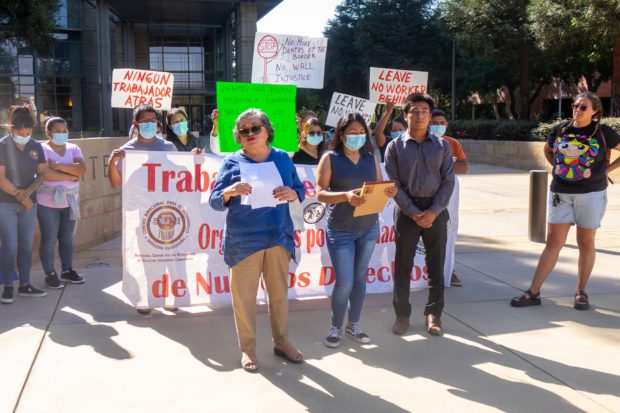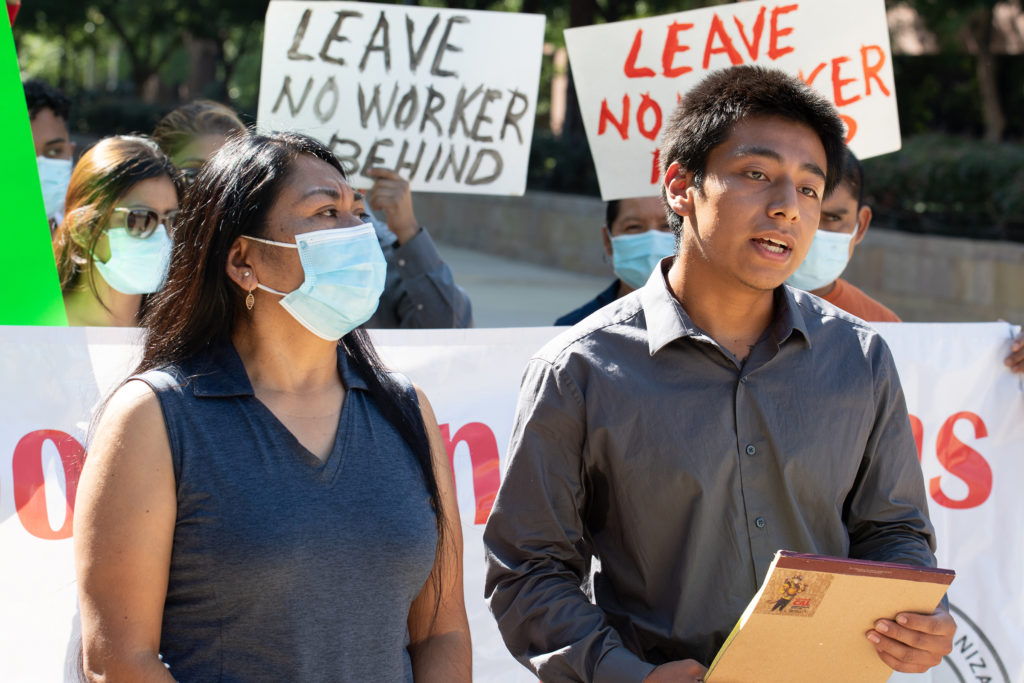
(Editor’s note: This article was originally published by Fresnoland, a nonprofit news organization.)
Fresno farmworker and immigrant rights groups are calling on Senator Alex Padilla to vote “no” on a piece of federal legislation they say would hurt both domestic and guest agricultural workers.
On Aug. 29, about 20 people gathered in front of the Robert E. Coyle Federal Building and U.S. Courthouse in downtown Fresno to state their opposition to the bipartisan Farm Workforce Modernization Act (FWMA).
“We strongly believe that farmworkers deserve better than the anti-labor Farm Workforce Modernization Act,” according to a joint statement by two Fresno area organizations.
“We don’t want laws that divide workers; we want living wages, better protections for farmworkers and a comprehensive immigration reform for all workers.”
The proposed law would create a pathway to legal residency for some undocumented agricultural workers who meet certain criteria and would expand the guest agricultural work program, also known as H-2A, a step opponents say could hurt farmworkers already in the United States, as well as guest workers employed through the program.
Opponents are instead calling for comprehensive immigration reform for the estimated 11 million undocumented people already living in the United States.

“We need a comprehensive immigration reform for all workers and for all people that live in this country and are contributing to the greatness and the economy of this country,” Oralia Maceda Mendez, program director for the Binational Center for Indigenous Oaxacan Community Development (CBDIO), said in Spanish, during the news conference.
“We want to urge Senator Padilla to oppose this (Farm Workforce Modernization) Act,” said Myrna Martinez Nateras, program director for the American Friends Service Committee. “And more than anything, to listen to us.”
While the legislation has passed the House of Representatives, it has not yet been introduced into the Senate. According to a July report by Politico, the expansion of worker rights to cover H-2A workers is a “sticking point” in the Senate negotiations.
As the son of Mexican immigrants and California’s first Latino U.S. Senator, Padilla has been a vocal advocate for immigration reform since taking office in January 2021. He was appointed by Governor Gavin Newsom to replace Kamala Harris when she became vice president. Padillia is seeking a new term in the upcoming November midterm elections, where he will face Republican attorney Mark Meuser.
Padilla supports the FWMA legislation and has said it would lay the foundation for immigration reform.
“Farmworkers labor every day under difficult and often dangerous conditions to put food on our tables and fuel our nation’s economy,” he said in an e-mail statement to the Fresno Bee.
“They deserve to be treated with dignity and provided a pathway to documented status.”
Why Farmworker Advocacy Groups Disagree on the Legislation
Farmworker advocacy groups are split on whether to support the FWMA.
The act, co-authored by Rep. Zoe Lofgren (D–San Jose) and Dan Newhouse (R–Wash.), results from a bipartisan effort that includes farm labor unions and advocacy groups and agricultural employers. An initial version of the legislation was proposed in 2019 but died a year later after failing to gain traction in the Senate.
The United Farm Workers (UFW) union and Farmworker Justice, a Washington, D.C.–based nonprofit, which support the legislation, say it would provide legal status to a large number of farmworkers.
Under the FWMA, undocumented farmworkers already working in the United States would be able to earn their green cards if they work in agriculture for 4–8 years and meet other criteria, according to a fact sheet from Farmworker Justice.
An estimated 350,000–450,000 California farmworkers could potentially obtain legal status through the FWMA, Daniel Costa, director of immigration law and policy research at the left-leaning Economic Policy Institute, told the Fresno Bee in June. Still, the exact number is difficult to pinpoint, Costa said, due to the challenges of securing exact data on the undocumented population.
Opponents, however, say the FWMA requires too many additional years of agricultural work to qualify for legal status.
Fabiola Ortiz Valdez, an organizer with the National Food Chain Workers Alliance, told the Fresno Bee in June that asking farmworkers to put in more years of “backbreaking work” under the promise of immigration relief is “completely unfair,” especially for the older farmworkers who have worked for decades in the fields.
Those protesting on Aug. 29, including representatives from the American Friends Service Committee, a Quaker social justice organization that calls for humane migration responses; CBDIO, the Binational Front of Indigenous Organizations; and the California Institute for Rural Studies, said that expanding the H-2A program under the FWMA could result in domestic workers already in the United States being replaced with foreign workers. They said they fear employers could use the program to replace workers who exercise their rights to speak out against poor working conditions.
But agriculture industry groups say the program is necessary to meet labor shortages in agriculture.
The H-2A program has grown exponentially in recent years.
In fiscal 2021, the Department of Labor certified more than 317,000 seasonal farm jobs to be filled by H-2A workers, up 15% from 275,000 in fiscal 2020 and more than three times the number of jobs certified in fiscal 2013, according to an analysis by the Wilson Center, a nonpartisan policy think tank.
The program’s growth is especially high in California, the analysis found, which is among the top five states to use the program.
Protesters Ask: What Did Alex Padilla Learn in the Fields?
During the news conference, Martinez Nateras questioned Padilla’s decision to spend a day in the fields alongside farmworkers.
In June, Padilla accepted an invitation from the UFW as part of their “Take Our Jobs” campaign and worked alongside farmworkers picking radishes and parsley in Moorpark.
He was the first U.S. Senator to accept the invitation.
“Did he (Padilla) learn that (many farmworkers)…have been here for over 20 years and they have not been able to regularize their status? Did he learn that these workers don’t have access to the essential services that they deserve?” Martinez Nateras asked.
She also said the coalition wants to meet with Padilla directly to discuss their concerns. She acknowledged that they’ve met with his staff “many, many times” but “haven’t been able to meet with him.”
Other protesters called for more scrutiny of the growing guest agricultural worker program and criticized Padilla for supporting its growth.
The H-2A program “needs to be examined from a historic angle,” Cristel Jensen, a community-driven strategist for the California Institute for Rural Studies, said during the news conference. Jensen warned the H-2A program contains elements of the Bracero program and could potentially repeat its mistakes.
The Bracero program was the executive order that allowed the United States to import millions of guest workers from Mexico to work in the harvest during war-era worker shortages. The controversial program, which ran from 1942 to 1964, had a number of documented abuses, while worker protections were often ignored, according to the Bracero History Archive.
Jensen said that Padilla should take care of the farmworkers that are already living in his state rather than supporting legislation to expand the guest worker program.
Padilla said he is committed to immigration reform beyond the FMWA.
“The first bill I introduced in the Senate would provide a path to citizenship for these essential workers,” Padilla said in the e-mail statement.
In the past, he has said he supports getting rid of the filibuster, which many see as a necessary step to immigration reform.
“Justice for farmworkers is long overdue,” Padilla said, “and I will keep fighting to fix our broken immigration system.”
By Community Alliance staff
The text of the Farm Workforce Modernization Act (FWMA), which calls immigrant farmworkers “aliens,” establishes the e-verify system for employers to verify the residence status of applicants:
“The Department of Homeland Security (DHS) shall establish an electronic system patterned on the E-Verify Program for employers to verify an individual’s identity and employment authorization. Employers hiring individuals for agricultural employment must use the system.”
This system, according to those who oppose the FWMA, will make employers reject the work applications of thousands of farmworkers living in the United States, creating a new layer of a marginal, impoverished labor force.
